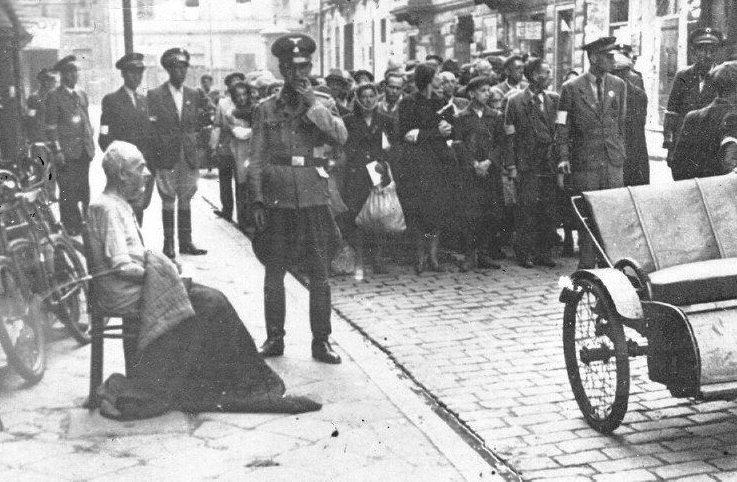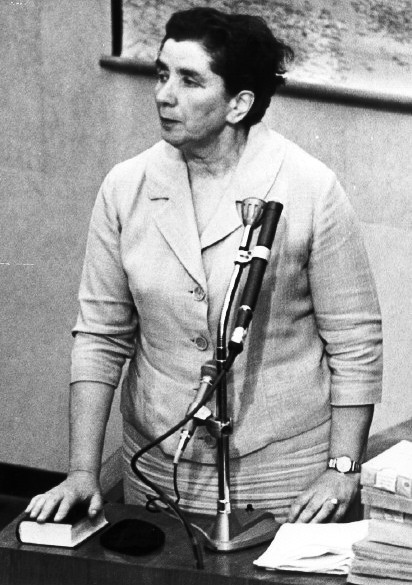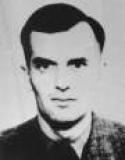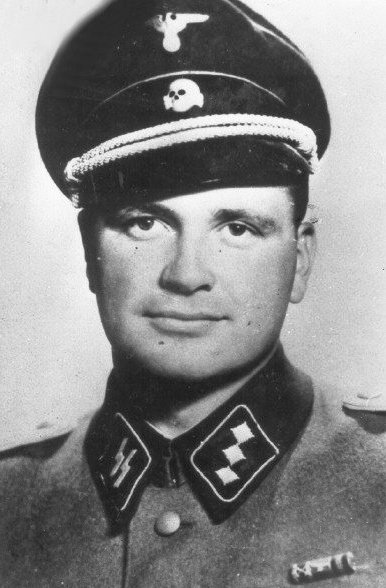Holocaust Education & Archive Research Team |
Revolt & Resistance
Acts of Resistance
Jewish Resistance
Groups Jewish Resistors Allied Reports Anti-Nazi Resistance Nazi collaborators
| |||
Meir Berliner Brave Act of Resistance at Treblinka
Meir Berliner was a citizen of Argentina who was visiting Warsaw with his wife and daughter when the Second World War broke out. Meir and his family were taken to Treblinka death camp.
Meir Berliner had arrived in Treblinka from Warsaw a few days before in one of the transports of the so called "Big Action" At that time it was the practice to take out several hundred people from each transport to work arranging the belongings of the murdered; the same day or a few days later, the group was liquidated and was replaced by other people selected from new shipments.
As the arrivals passed the large number of piles of clothing scattered everywhere, they became suspicious. They were never given time to think, discuss, or plan a response. The transports from the East, carrying Jews who suspected their fate, were met by brute force, designed to induce shock and thus make revolt impossible. When those transports arrived, SS and Ukrainian police lashed out at the Jews with whips to hasten their departure from the trains.
Those who fell behind were immediately shot. The rest were, within hours of their arrival, selected for extermination, the separation of men from women, the stripping of clothes and valuables, and the marching or running to their deaths was completed.
Berliners wife and daughter were selected for the gas chamber, whilst he was selected to live and work. Abraham Krzepicki who escaped from the Treblinka death camp after eighteen days after being deported on the 25 August 1942, befriended Meir Berliner in the camp.
He gave his account to Rachel Auerbach during December 1942 and January 1943 in the Warsaw ghetto:
“I made the acquaintance of a Jew from Warsaw named Berliner. Berliner was about forty-five years old and had lived in Argentina for years. He had served in the Argentinean army and was an Argentinean citizen.
It would take us too far afield to relate how he had happened to be stranded in Poland, unable to enjoy the protection of his foreign citizenship, and how he, his wife and his daughter had come to Treblinka.
By the time I met him his family were no longer alive. They had entered the showers a week earlier, as soon as they had gotten out of the boxcar. He a dark-complexioned, broad shouldered, healthy man, happened to be among the lucky ones, he was one of the workers who had had their death sentences postponed for a week or two – perhaps even three.
Berliner was a man of real integrity, a true friend, at every opportunity he would share a bite to eat, a cigarette or a drink of water: if there was any chance to help some body out, he would come running. As a result he had become well-known and well-liked.
But in our talks in the woods about finding a way to escape, Berliner would not go along with us.
“We’d be killed. We’d be killed,” he would say. “But there is one thing I want: Revenge.”
He did like the idea of jumping the Ukrainians and disarming them, but since most of the workers were opposed to this plan and no consensus could be reached, nothing came of it.
As we marched back to camp each night, our hearts grew heavy on the way. Would we be able to sleep through the night? We arrived at the guard station. The gate closed behind us. Once again we were on the territory of the Treblinka murder factory. And so September 11 arrived.
That day, as usual, we bought food in the woods from the peasants. The Ukrainians came dragging two big baskets and everything was divided up according to the orders placed by the workers. Some of the young men brought brandy. Berliner, too, bought a bottle of brandy that day.
When we got back to the camp at about 6 o’clock that evening, our whole world turned black. Even from some distance away, we could see something new going on in the roll call square.
This was the selection which we had been expecting for so long and with such great fear. A few individuals, and then the whole group tried to pull a fast one and slip away into the barracks, to crawl into some hole, but it was impossible.
The earth refused to open up beneath our feet and there was no other hiding place. “Line up! Fall in.” We were driven forward and here we were, like little lambs ready to let themselves be chewed up by the wild wolf. Several hundred healthy young Jewish men stood there, as meek as little children and two Germans plus several Ukrainians arrogant and insolent had their way with us.
A finger pointed at this one, then at that one. Sometimes we didn’t even know where danger or death was lurking. The Scharfuhrer divided us with his whip – this one to the right, then one to the left. I was put with those who were sent to the left – to the “showers.”
Terror shackled our hands and our legs. We stood like statues and though we had nothing left to lose, meekly obeyed, still trembling before the anger of the hangman.
I was standing right next to Berliner. I didn’t notice anything. I never saw when or from where, he pulled his knife. I looked at him only after he had leaped out of the line and with all his strength had plunged his knife into the back of the Scharfuhrer who was doing the selection.
The German groaned and turned deathly pale. Two men rushed to the scene and carried him away half-unconscious. It would be hard to describe the turmoil which ensued in the roll call square. Jews, Germans, Ukrainians alike were plunged into utter confusion.
SS-men came running, “Was is Los, was ist Los” (What’s the matter, what’s the matter). They seemed to be terrified. They drew their revolvers from their holsters and didn’t know in what direction to shoot, upon whom to throw themselves like wild animals, or from whom to defend themselves. It was a real pleasure to see how they lost their heads.
Berliner made no attempt to flee or to hide. He just stood there, cold blooded and calm, with a strange little smile on his lips, his hands opening the flaps of his jacket, leaving his chest bear. “Please, he said, I’m not afraid. You can kill me.”
His death was terrible. I don’t know from where the shovels with which the Ukrainians and SS men attacked Berliner had come to the roll call square, or whose order it had been to kill him with these tools.
But minutes later, he was stretched out on the ground, his face terribly mutilated and blood gushing from his mouth. The SS –man whom Berliner had stabbed was perhaps the nicest – if such an adjective can be used – of the Treblinka Germans: Scharfuhrer Max Bialas.”
Boris (Kazik) Weinberg who was deported from Warsaw to Treblinka on the 4 September 1942 when transports from Warsaw were resumed, also witnessed Berliner’s heroism:
“When we had formed up in the evening roll call, the German in charge ordered all those who had arrived in the camp that same day to form up separately. The men hesitated as to where to stand – were the Germans going to eliminate the new arrivals, or the veterans. At first no one moved, then a few left the ranks.
The Germans began beating the men brutally. At that moment a man jumped out of the ranks, ran towards the German Max Bialas, with a drawn knife, and stabbed him in the back. He did the deed – then stood by, hesitating.
One of the Ukrainians, Corporal Manchuk, saw what happened and ran over and hit the assailant on the head with a shovel he was holding. With Bialas lying on the ground bleeding from his wound, the Ukrainians began hitting and shooting into the crowd. Dozens were killed and wounded.
The deputy camp commander Kurt Franz, who was nicknamed Lalka arrived on the scene. (Lalka, the “doll,” was the name given to Franz by the prisoners because of his innocent face, like that of a doll.) Franz had the wounded Bialas evacuated, stopped the wild shooting and ordered the Jews to form up again.
He ordered the “camp elder” Galewski to stand in front of the roll call, beat him with a whip he carried, and announced that if such an event occurred again, he Galewski would be executed. Christian Wirth, who was still in Treblinka, was summoned. He ordered ten men to be selected and shot. Kurt Franz chose them, and they were shot in front of the roll call.
The others were put into barracks and held there all night. The next day there was no usual 6am roll call. The Jews locked in their barracks feared the worst. At 7:30 am they were taken to roll call. It was held under a heavy guard of SS and Ukrainians. One hundred and fifty men were selected, taken to the ditches and shot as a punishment for the killing of Max Bialas.”
Max Bialas, who was badly wounded, was taken immediately to the army hospital in Ostrow Mazowiecki, he died of his wounds either en route or at the hospital.
The camp command decided to commemorate the dead SS man by naming the Ukrainian guards barracks after him, a sign was affixed to the barracks entrance – “The Max Bialas Barracks.”
*Note [Max Bialas] The SS man murdered was Max Biala, there appears to be many variations regarding the spelling of his name from survivor accounts. However, H.E.A.R.T believes the correct spelling to be Max Biala
Sources:
Belzec, Sobibor and Treblinka, by Yitzhak Arad, published by Indiana University Press Bloomington and Indianapolis 1987 Holocaust Historical Society PRO
Copyright: Joel Stein & Chris Webb H.E.A.R.T 2009
|




